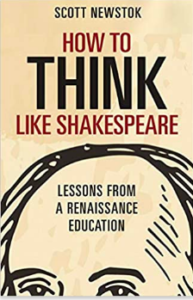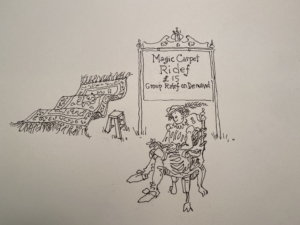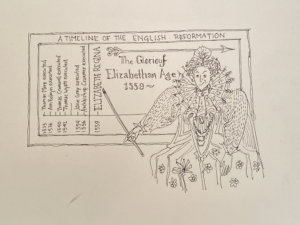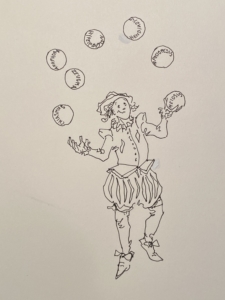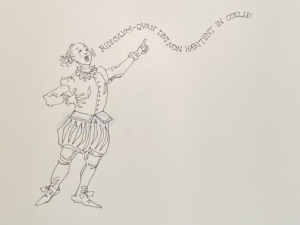In the spirit of the day, I’m reposting a blog entry from three years ago, posted right on the eve of the epidemic!
Happy Holidays!
Keeping in the spirit, this post is just to tell some of the history of the participation of child actors in the Christmas celebrations from the middle ages through the Elizabethan era. The holiday season provided light and laughter in the dead of winter in villages all over England, in the country manors of the aristocracy, and at the royal court.
During Shakespeare’s day, we know that schoolboys traditionally provided theatrical entertainment in villages, and there is evidence of dozens and dozens of plays presented for the aristocracy by the boys’ companies I’ve written about in previous posts.

The Boy Bishop
The traditions go far back in time, and virtually all of them provided some sort of upending of the customary ways, liberally spiced with hilarity.
Let’s start with the tradition of the Boy Bishop, celebrated all over Europe, dating back to the the early years of Christianity. In English villages the Boy Bishop was traditionally elected on the 6th of December, the feast of Saint Nicholas, and and his authority lasted till December 28, the Holly Innocents’ Day. He and his entourage were usually chosen from the choir boys at the local church. During his rule the real Bishop would, symbolically, step down at the deposuit potentes de sede of the Magnificat (“he hath put down the mighty from their seat”), and the boy would take his seat at et exaltavit humiles (“and hath exalted the humble and meek”). The elected boy would be dressed in full bishop’s robes, complete with mitre and cozier, and his comrades would be dressed as priests. They would travel about the parish blessing the townsfolk and would perform all of the ceremonies at the church except for the mass. It was a solemn rite, but being boys, they most likely had some fun hamming it up. Except for a brief revival during the rule of the Catholic Mary, this custom did not survive the English Protestant Reformation; but it was still very much in evidence all over the realm early in the reign of Henry VIII.

Saturnalia

Celebration of the Lord of Misrule
And then there were the Feast of Fools and the twelve days of Christmas, culminating in Twelfth Night, on the eve of the Feast of Epiphany. During the twelve days of Christmas, traditional roles were often relaxed, masters waited on their servants, men were allowed to dress as women, and women as men. Often a Lord of Misrule was chosen to lead the Christmas revels. The boy king, Edward VI, was especially enamored of this comic Lord, who played a significant role in the Christmas festivities during his reign. Some of these traditions were adapted from older, pagan customs, including the Roman Saturnalia. Shakespeare’s play Twelfth Night was written for festivities of this kind and delights in the audacity of the servants in the manor houses of Olivia and Orsino.
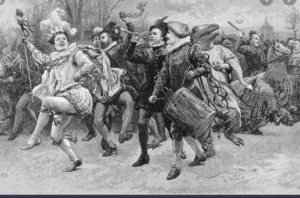
Christmas Revelry
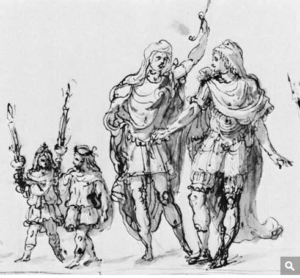
Boy Players in a Masque
At court Christmas was also a time of elaborate celebrations including masques, which always included “interludes” performed by boy actors, or “interluders”. Then, of course, there was the music. It is impossible to overstate the role of the voices of boy singers, thought to be the voices of angels. Entire cathedrals were designed as huge acoustical sound boxes to capture the purity of the sound, and that sound was heard throughout the realm during the Christmas season.
So Christmas rituals were a combination of deep solemnity and a raucous inversion of norms. Contemporary celebrations like the carnivals held in South America have their origins in the chaotic social reversals overseen by the Lord of Misrule, but I can think of no contemporary parallel during Christmas that is quite so colorful. Children have always been delighted by the temporary freedom provided by an upside down world. Today what Christmas means for children is presents. In those days it was the sheer joy and freedom of revelry.
https://www.robinlithgow.com/2019/12/
REMINDER:
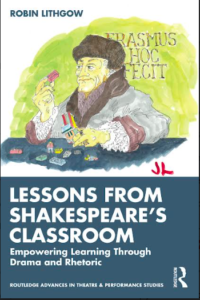 My new book, “Lessons from Shakespeare’s Classroom: Empowering Learning Through Drama and Rhetoric,” is available for pre-order and will be sent out at the beginning of January.
My new book, “Lessons from Shakespeare’s Classroom: Empowering Learning Through Drama and Rhetoric,” is available for pre-order and will be sent out at the beginning of January.
https://www.routledge.com/Lessons-from-Shakespeares-Classroom-Empowering-Learning-Through-Drama/Lithgow/p/book/9781032384061
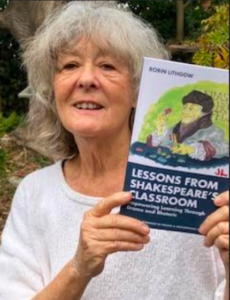 It’s here! My book, “Lessons From Shakespeare’s Classroom: Empowering Learning Through Drama and Rhetoric” was released a week early, and I already have a great comment to share from an early reader. Ginger Culver, an artist from Seattle and a friend of my daughter, read it right away and had this to say:
It’s here! My book, “Lessons From Shakespeare’s Classroom: Empowering Learning Through Drama and Rhetoric” was released a week early, and I already have a great comment to share from an early reader. Ginger Culver, an artist from Seattle and a friend of my daughter, read it right away and had this to say:




 My new book, “Lessons from Shakespeare’s Classroom: Empowering Learning Through Drama and Rhetoric,” is available for pre-order and will be sent out at the beginning of January.
My new book, “Lessons from Shakespeare’s Classroom: Empowering Learning Through Drama and Rhetoric,” is available for pre-order and will be sent out at the beginning of January.